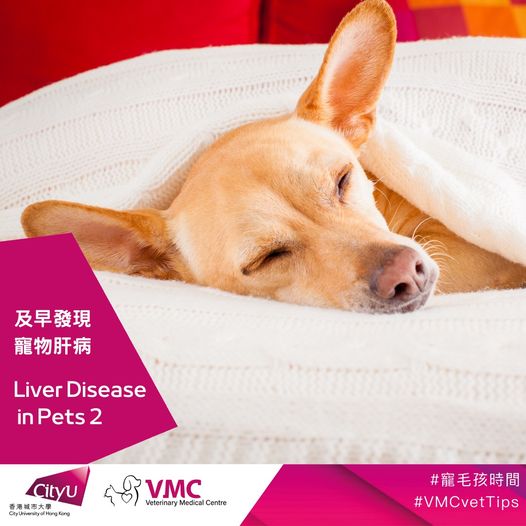【VMC Vets Tips! | Liver Disease in Pets Part 2】
Jan 28, 2022

The liver is an important organ for your dog. It helps with digestion and blood clotting, and it removes toxins from their system. If it's not working right, it can make your companion sick. But liver disease can often be treated and managed.
Symptoms:
- Loss of appetite
- Weight loss
- Vomiting or diarrhea
- Increased thirst and pee
- An unstable walk
- Confusion
- Yellowish eyes, tongue, or gums (jaundice)
- Signs of weakness
- Blood in their pee or poop
- Ascites (a buildup of fluid in the belly)
- Hepatic lipidosis is one of many liver diseases of cats which can cause suddenly stop eating or experience sudden excessive weight loss. It can be the primary problem or secondary to another disease process.
If your pet's liver disease isn't caught early, it can lead to a serious brain condition called hepatic encephalopathy.
Treatment
Treatment of liver disease in pets is focused on managing the symptoms and addressing the underlying cause if it has been diagnosed. It can include:
- Fluid therapy to treat or prevent dehydration
- Antibiotics to eliminate a bacterial infection
- Medications to control symptoms such as vomiting, gastrointestinal bleeding, or inflammation
- Surgery to remove cysts, gallstones, or cancerous portions of the liver
- If your pet has liver cancer, chemotherapy or radiation could also be part of the treatment recommendations.
- Diet changes often help. Your pet may need a special diet to make sure they are getting the nutrients and calories needed to help their liver.
- Supplements such as SAM-E or milk thistle may help the liver recover.
- Cats usually need to be hospitalized and fed special diets via a feeding tube until such time that they are able to feed again for themselves. Although many cats do recover with intensive support, recovery may take months.
Not all cases of liver disease can be prevented, but certain precautions can reduce the risk of specific diseases. Dogs should be vaccinated for infectious canine hepatitis and, for some dogs, leptospirosis. Keep your pet away from known toxins. And most importantly, know the signs of liver disease and see the vet sooner rather than later if you are concerned! Early intervention and treatment are key factors in treating liver disease and preventing serious signs.
Appointment/Enquiry:
3650 3000 (Mon-Sun: 9:00am – 7:00pm)
Address:
G-2/F, Trinity Towers, 339 Lai Chi Kok Road, Sham Shui Po
Online booking for revisit with primary care veterinarians or vaccination:
https://www.cityuvmc.com.hk/en/online-booking